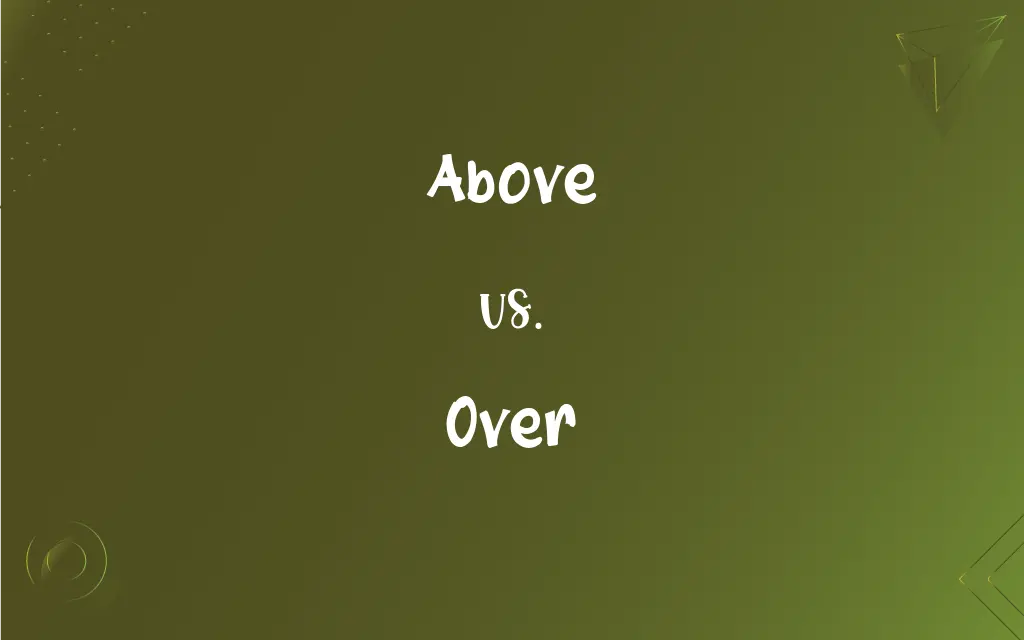Above vs. Over: What's the Difference?
Edited by Aimie Carlson || By Harlon Moss || Updated on October 23, 2023
"Above" often indicates a relative higher position without contact, while "over" implies covering or spanning across; both can mean "higher in place or position."

Key Differences
"Above" and "over" are prepositions often used interchangeably but with subtle differences. "Above" typically describes something that is at a higher level, but without direct contact. For instance, a painting hung on a wall may be described as being above a fireplace if there's a gap between them.
On the other hand, "over" suggests there's a covering or that something spans across another. For instance, a blanket thrown across a bed is over the bed. Similarly, a bridge stretching across a river is over the river, indicating a direct covering or spanning.
However, there are instances where "above" and "over" can be used interchangeably without much change in meaning. For example, when talking about altitude or height, one might say an airplane is flying above the clouds or over the clouds. In this context, both prepositions indicate the airplane's higher position relative to the clouds.
Still, there are specific idiomatic expressions where one word is preferred over the other. For instance, we often say "above all" to mean "most importantly" but we don't use "over all" in the same context. Similarly, "over" can indicate completion, as in "the game is over," a usage not shared by "above."
It's essential to note that context matters. Depending on the situation, "above" and "over" may have different implications, and it's crucial to choose the word that conveys the intended meaning most accurately.
ADVERTISEMENT
Comparison Chart
Positional Relation
Indicates higher position without contact.
Implies covering or spanning across.
Altitude or Height
Can be used to indicate higher altitude or level.
Also used for altitude; can be interchangeable with "above".
Idiomatic Expressions
Common in expressions like "above all".
Used in phrases like "over time" or "game is over".
Coverage
Doesn't imply covering.
Suggests a direct covering.
General Usage
More specific to position without direct relation or contact.
Broader use, can indicate position, coverage, or completion.
ADVERTISEMENT
Above and Over Definitions
Above
Superior in rank or authority.
The manager's office is just above mine.
Over
At a higher position or level.
The stars shone over the city.
Above
Beyond or outside of.
This material is above my understanding.
Over
Indicating possession or control.
She took over the project.
Above
At a higher level or position.
The bird flew above the trees.
Over
From one side to the other.
Jump over the fence.
Above
In preference to.
She values honesty above all else.
Over
Indicating completion or an end.
The show is over.
Above
More than a specified amount or degree.
Temperatures soared above 100 degrees.
Over
Spanning or covering.
Drape the cloth over the table.
Above
On high; overhead
The clouds above.
Over
In or at a position above or higher than
A sign over the door.
A hawk gliding over the hills.
FAQs
Is "over" used in terms of age?
Yes, "over 30" means older than 30.
Does "over" have a directional sense?
Yes, "move it over" can mean to shift directionally.
Can "above" and "over" always be used interchangeably?
No, while sometimes interchangeable, they often have distinct implications.
Can both "above" and "over" refer to altitude?
Yes, an airplane can fly above or over the mountains.
What's the idiomatic use of "above"?
Phrases like "above all" mean "most importantly."
What does "over" suggest in terms of coverage?
"Over" implies that something spans across or covers another thing.
What's an example of "over" in the context of overcoming?
"Get over it" suggests moving past or overcoming an issue.
How does "over" indicate control?
Phrases like "take over" imply assuming control or possession.
Can "over" indicate a transition?
Yes, like "hand it over" meaning to give or transfer.
When should I use "above" in terms of position?
Use "above" to indicate a higher position without direct contact.
Can "above" indicate superiority?
Yes, for instance, "above average" implies better than the norm.
Does "over" always imply direct contact?
Not always; "over the phone" means through a phone call.
How is "above" used in the context of literature?
"As mentioned above" refers to previous parts of a text.
How does "over" indicate completion?
In contexts like "the game is over," it signals an end.
Can "above" suggest something being exceptional?
Yes, as in "go above and beyond" meaning to exceed expectations.
What does "above" imply in terms of quantity?
It can mean "more than," as in "above fifty dollars."
Is "over" used in expressions of time?
Yes, as in "over the years" meaning throughout the years.
Can "above" indicate an exception?
Yes, in contexts like "above the law," it implies an exemption.
Can "above" imply superiority in rank?
Yes, "ranked above" means having a higher rank.
How is "over" used in terms of movement?
"Walk over" suggests moving from one place to another.
About Author
Written by
Harlon MossHarlon is a seasoned quality moderator and accomplished content writer for Difference Wiki. An alumnus of the prestigious University of California, he earned his degree in Computer Science. Leveraging his academic background, Harlon brings a meticulous and informed perspective to his work, ensuring content accuracy and excellence.
Edited by
Aimie CarlsonAimie Carlson, holding a master's degree in English literature, is a fervent English language enthusiast. She lends her writing talents to Difference Wiki, a prominent website that specializes in comparisons, offering readers insightful analyses that both captivate and inform.































































